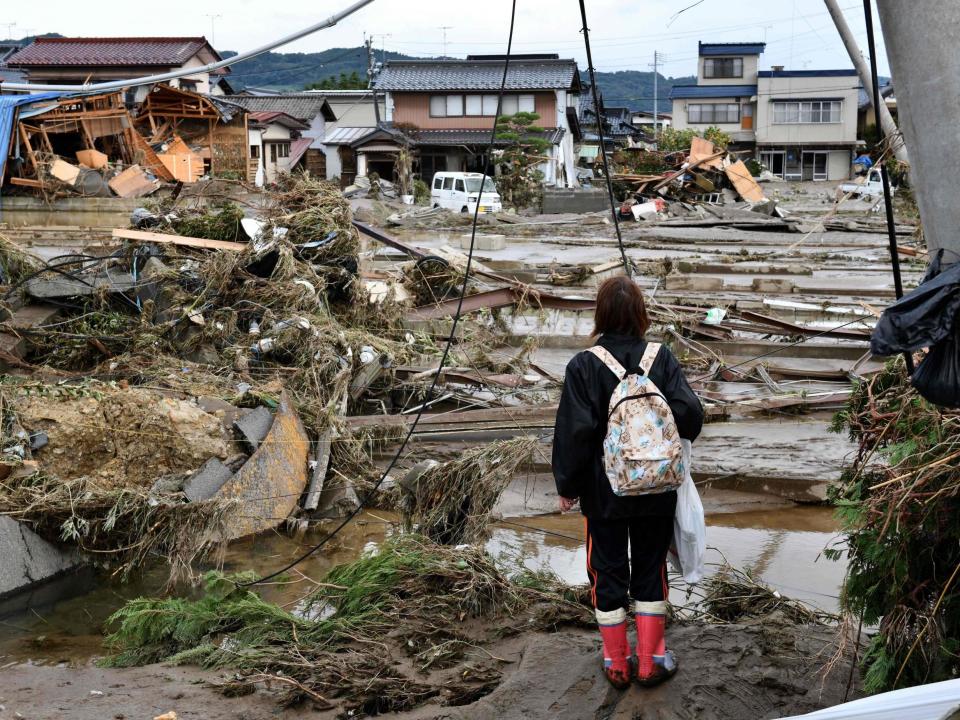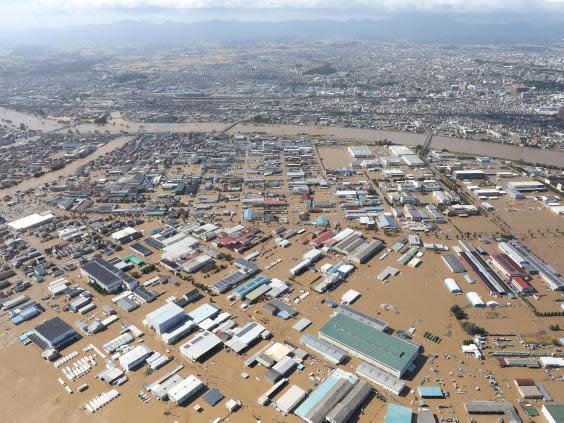Against a backdrop of tragedy, Japan look to inspire hope in quarter-final with South Africa

With the rush and electricity of the previous 80 minutes still coursing through him, Michael Leitch’s post-victory thoughts turned immediately to the victims. “For those suffering from the typhoon this was for you guys,” he said pitch side as those in the Yokohama Stadium, bewitched by what they had seen, softened their voices to listen to the captain’s solemn words. By the time the referee’s whistle was blown in Yokohama, confirming Japan’s first-ever quarter-final berth at a Rugby World Cup, the death toll had risen. More lives lost in the rain and dirt. Five days later, that figure now stands at 74, with many others still missing. Typhoon Hagibis has left its mark.
It’s against this backdrop that Japan, led by the commanding Leitch, take on South Africa in Tokyo. The circumstances have made for something unique on these shores. Although the nation is no stranger to natural disasters, rarely has a sporting narrative of this stature and significance found itself caught in the crosshairs, with the hosts now within reaching distance of the last four.
At a time of so much suffering and pain and loss, what place does sport have in the conversation? How can the drama, the intricacies, the ebbs and flows of one rugby match alleviate the agony of those lives which have been shaken in the storm? Is it not best to separate the two? Japan were forced to grapple with such questions in the late hours of Saturday evening and the rising light of Sunday morning.
“Before the match at the team hotel the players already knew this game was about more than just us,” added Leitch in the wake of Sunday’s win. You could see it in the stands and on the faces of the fans. Ahead of kick-off, as the national anthem rose to its climax, ceremonial and almost harrowing in tone, many clad in red and white were reduced to tears. With so many threads to the tale – the devastation wrought by Hagibis, the eventual deliverance of Sunday’s match, the agony and ecstasy that awaited the two sides – the emotion of the occasion was unprecedented: charged, forceful, unlike anything those present had experienced before.
And now, as the country comes to terms with the full scale of suffering carved out by one of the largest typhoons seen in decades, Jamie Joseph and his men must do it all again. The side may have weathered their own storm in Yokohama, but the reality for those affected by Hagibis has not changed in the days that have followed.
NHK, Japan’s national broadcaster, reported this week that 13,000 houses were submerged across the country and more than 1,100 at least partly destroyed by floodwaters. Meanwhile, about 12,000 homes are still without electricity or have no running water. It’s unclear how long it will take for utilities to restore full-working service. As of Wednesday afternoon, thousands remained in local evacuation centres – municipal buildings, sports halls, high schools – unable to clean up their homes.
In certain parts of Koriyama, an industrial hub in Fukushima Prefecture, the waters had risen high, reaching chest height in little more than an hour. To the east of the Abukuma River, which meanders through a number of cities in the prefecture, the damage was extensive. The neighbourhood of Suimoncho, nestled in a sunken-like bowl along the river, found itself engulfed once a three-metre high levee was breached. By dawn’s break on Sunday, all that could be seen were the grey and brown rooftops.
Fukushima, which suffered immensely under the horrors of the 2011 earthquake and tsunami, was one of the hardest-hit prefectures over the weekend. Of the 74 people so far confirmed as dead, with many others still missing, 25 are thought to have come from the north-easterly region.
With the floodwaters now gone in Koriyama, residents must prepare themselves for the long road ahead. Walking Suimoncho’s streets, the scale of destruction is laid bare. Whole homes cleared of their possessions, left to rot or bake in the hot sun. Buildings wrapped in scaffolding. Debris scattered everywhere, caught in river reeds and trees bent forward by the storm’s winds. The recovery efforts are already in full swing, with local officials suggesting it could take more than a month for public areas to be cleared and homes to be fixed.

“There’s never been this much damage before,” says Moe Kaneda, a teacher in Koriyama’s city centre. “This is the first time ever.”
For Chiko and her family, there’s a long way to go before any sense of normality returns. Their house, close to the foot of one the river’s levees, has been devastated. “I think it’ll take a month to sort,” she says, a wheelbarrow to hand and with a mask covering her face. “The bottom floor is completely ruined. Everything is gone.”
The worry is what comes next for Koriyama, Fukushima and similar areas that are continuing to bear the brunt of Japan’s natural disasters. While the likes of central Tokyo woke to sharp sunshine on Sunday, unharmed and largely unscathed by Hagibis, the same cannot be said for those regions where the infrastructure in place offers insufficient resistance to the fury brought by typhoons, earthquakes and tsunamis.
In the capital, subterranean surge chambers, some the size of cathedrals and two football fields long in length, protect the city above during heavy storms and the torrential downpours they generate. In Koriyama, the main line of defence are banks of earth three metres high.
Although Hagibis was unprecedented in scale and ferocity – weather officials said some places that flooded received up to 40 percent of their annual rainfall in just two days – some are fearful that, under the effects of global warming, a similar-sized storm will return in the near future. “It could be climate change,” says Moe. “This is the first time it’s been very bad but after a year or sometime we could get hit by another big typhoon because of warming.”

In these parts, for now at least, any consideration beyond survival and recovery may well seem unnecessary. Anything that falls outside of those two instincts can often fade into irrelevance, lost as mere background noise. Joseph and the Japanese national side will know this. When they line up to face the Springboks on Sunday evening, there will be those hit by Hagibis who do not have the means or time or desire to watch this historic occasion. Yuki Yaginuma, a resident of Suimoncho, said that although he’d been following Japan at the World Cup, he was “unsure if I’ll be able to see them” given his circumstances.
Which only increases the significance of this weekend’s quarter-final. Leitch and his players can deliver more than just glory and history. They can deliver hope. They can bring comfort, relief, a distraction of the welcoming kind.
And against the South Africans, a team they famously stunned in 2015, they can do so in typically Japanese fashion: with injections of turbo-charged pace down the flanks, surges of rolling interplay, fuelled by those lightning quick offloads, and an abundance of resilience – that quality which, more than any other, speaks loudest among the population during these times of adversity. “People came together after the earthquake [in 2011], we will do the same,” says Moe. “Maybe the [Japanese rugby] team can help. They can give people hope.”
Japan, as a host and as a team, has already answered the call of duty – both to itself and the international game. Last weekend was testament to that. The character of the country, its people and players will be long remembered once the curtain falls on this tournament. What comes next, then, is infinitely more personal. For the individuals taking to the field in Tokyo, it’s about serving those who have suffered under Hagibis. There is no expectation weighing down on this fixture. No historical burden. No controversy waiting in the wings, as with last weekend. For the hosts, this will be a night shared between its players and the nation – a night that, however briefly and regardless of the outcome, can lift spirits across the county.

 Yahoo Sport
Yahoo Sport 





































